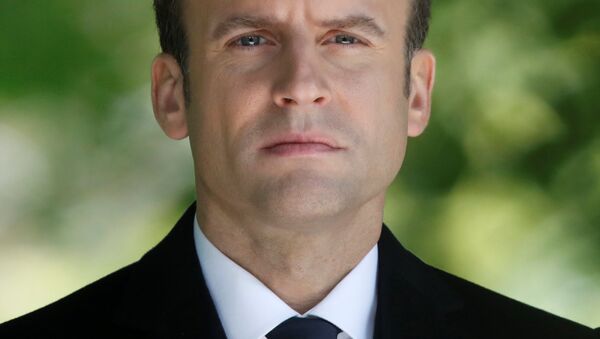The current youthful and highly photogenic leader of France, Macron, owes a great deal of his success to the reluctant rejection of another politician.
It's tempting to wonder how many of those who took a chance on this flamboyant and charismatic leader were really voting for him at all; and how many were, instead, abandoning his older and more erratic second round opponent.
Unlike the dashing and handsome Macron, Le Pen is an elder stateswoman who is no stranger to controversy, and who is well known to the tittle-tattling and over-curious French as a key fixture of tantalizing tabloid gossip and innuendo.
After fighting off the enthusiastic banter and seductive rhetoric of his highly cunning opponents from an earlier time, Macron was finally faced with his most indomitable debate partner of all:
Now, although Macron and Le Pen may seem an odd couple, the second round of the presidential election often does bring strange bedfellows; so we can hardly blame Macron for being a little energetic in his recent tiffs with the solemn and matronly MLP!
And yes: despite Le Pen’s long experience and advanced techniques, Macron still managed to rule the roost, and to finally end up on top; without looking either weak, or exhausted, or short of witty retorts to the relentless teasing and baiting his opponent threw at him.
After their fiery rows during the televised debates, there was talk of a libel lawsuit, but it is to be hoped they will soon kiss and make up; otherwise, there might be undue friction in the French political scene.
And surely love and unity and the audacious hopes and dreams and ever-fertile imagination of youth are needed more than ever before, in the face of a never-ending French media onslaught against France’s most controversial yet ever-photogenic odd couple of Parisian politics.
Marine Le Pen is considered by polite society to be the rather more respectable and reputable daughter of the rather stern Jean-Marie Le Pen, whose watchful gaze has loomed over the pastures green of French politics for quite some time.
Thus it was that the shadow threat of far right authoritarianism loomed over the virgin ‘Liberté,’ known to more stuffy and pedantic and straight-laced Englishmen as ‘Lady Liberty.’
Political gossip has largely centered around warning the French not to be seduced and entangled by the cunning agenda of Marine Le Pen.
And yet, it is not yet clear whether Macron shall prove himself a mature elder statesman, or a naïve and impulsive young man who works on instinct alone, rather than a chastened and matured wealth of bitter experience.
This 'far center' is not about one individual alone, or one party.
It is a matter of certain shared pathological assumptions and extremist ideological tendencies that (to a substantial degree, at least) cut across partisan left-wing/right-wing party lines.
Here are just a few of these:
1. Rootless Cosmopolitanism.
Continental nationalism (Spaceship Brussels) and a dynamic globalism (Spaceship Earth) are the fantastic launching pads that will catapult French citizens (or better still, the faceless, flavorless bloc of whatever-ness known as ‘the people,’) above the partisan loyalties of faith, family and flag.
Like the ancient Gnostic heretics of Christianity, or the privileged bonzes of medieval Tibet, there is a higher morality that is handed down from the elites, and this privileged knowledge is not to be questioned.
It is not subject to rational debate; it is a ‘gnosis,’ or an intuitive knowledge that lies behind the vulgar commonplace reasoning of the mob.
2. Humanitarian Sentimentalism.
To many reasonable thinkers, every political crisis is a political crisis. However, to the globalist, this is not so. For the globalist, some crises are ‘humanitarian crises,’ and thus have a special privileged status.
By using the emotive term ‘humanitarian crisis,’ the globalist attempts to manipulate the emotions of the unwary, and blackmail them into demanding certain actions rather than certain other actions; or at least of being complicit with such. If, however, the term ‘political crisis’ were used, then of course, that would be another matter.
Here is a critique of the philosopher Zizek’s account of emotional manipulation, in a recent interview. The critique is not favourable to Zizek; but it is hard to deny that the word ‘humanitarian crisis’ does indeed place sentiment over reason.
3. Protectionism.
Isn’t globalism anti-protectionism, though?
It is, in the economic sense.
However, I am speaking more of what the feminist Susan Griffin calls ‘protectionism.’ A kind of paternalism, an undue and intrusive concern for the wellbeing of those under one.
There is healthy nurturing and protection; and there is a kind of moral pathology too.
France, like many European countries, is spiritually compromised by the tumorous proliferation of anti-speech diktats.
If the Nazis burned books, their modern-day globalist successors arrest and prosecute Nazi sympathizers, in the form of Holocaust denialists.
Now isn’t that progress!
It seems that French politicians, and many individuals in civil society, have learned very little from the Nazi occupation.
Or to put it another way:
Perhaps they have learned a little too much.
And of course, the jewel in the crown of the erstwhile Empire, nowadays called ‘the Republic,’ is the Marxist Gayssot Law, spawned from the incestuous union of a Communist and a Nazi collaborator: Gayssot and Mitterand.
"In such countries, genocide is not too important."
It is simply impossible to imagine that the Gayssot Law has not acted as an anti-Semitic incitement for the white nationalist and Islamist far rights, as well as extreme Christians and Muslims.
What the future holds for the Jews of France (if indeed there is a future at all for these half-demonized, half-protectionized citizens) is far from clear.
But a country that is prepared to tolerate a law to forbid anti-Semites from lying about the Holocaust is but a short step away from tolerating a law to forbid Jews to express themselves; or indeed individuals of any other vulnerable demographic.
You can either have hate speech laws or you can have freedom of speech, but you can't have both.
You can either have historical negationism laws or you can have freedom of speech, but you can't have both.
You can either have barbarism or civilization, but you can't have both.
So, what will Macron do?
Will Macron reject the false promises of globalism, the dishonest sentimentalism of humanitarianism, and the hypocritical generosity of protectionism?
We will have to see.
It is to be hoped that Macron will roll back hate speech and historical negationism laws in their entirety, along with rootless globalism and the satanic death cult of humanitarian warfare and species-engineering; thereby taking a very different path from his predecessors (who opened the gates of hell in Mali, and have practically annihilated Libya).
Nothing short of this is remotely acceptable or entertainable.
If, however, Macron decides to buttress and establish the currently morally bankrupt status quo, he may well be damned by history as a greater menace to French liberal and secular values than Marine Le Pen has ever been; and in practice, not only in theory.
Let us watch closely to see which path he takes.
For there is no middle ground, and no third option.
Either way, let’s hope there are no tears before bedtime. La Belle Republique is a still a spirited and enchanting warrior, so we hope Macron will not be too overawed and cowed by her demands.
The views expressed in this article are solely those of the author and do not necessarily reflect the official position of Sputnik.




